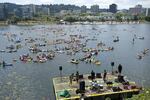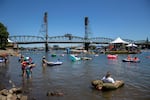
Swimmers enjoy the Willamette River in downtown Portland in 2018.
Willie Levenson
On Wednesday, Portland’s Arts and Economy Committee will consider signing with the international Swimmable Cities organization.
The Australia-based nonprofit is built around the idea that all urban waterways should be safe enough for swimming.
Matt Sykes, a cofounder of Swimmable Cities, will be traveling from Melbourne to Portland later this week to advocate for the movement.
“Safe, healthy and swimmable urban waterways should be accessible to all people,” Sykes said in a recent phone interview.
Portland — like Copenhagen, Denmark, and Zurich, Switzerland — has been working to make its rivers swimmable for years.
Most noticeably, the city spent more than a billion dollars on the Willamette’s Big Pipe Project. It has significantly reduced the amount of sewage that flows into the river after rainstorms.
Other international cities are now taking notice, especially after Paris held swimming races in the Seine during the Olympics.
Related: 2024: Men's Olympic triathlon postponed due to Seine water pollution levels
Sykes said it’s important for Portland to join 72 other cities across 27 countries supporting swimmable water.
“We’re part of a global community and, yeah, we’re all together standing up for this right to swim, as well as the rights of nature, because the two are interconnected,” Sykes said.

The 8th Big Float event, taking place in front of the Hawthorne Bridge at the Tom McCall Waterfront Park in downtown Portland, Ore., is hosted by the Human Access Project to encourage people to swim in the Willamette River.
Miranda Daviduk/OPB
Willie Levenson, who has championed swimming in the Willamette River since Portland’s big sewage overflow pipe was completed 14 years ago, supports the signing.
“There’s no cost to the city to do this,” Levenson said. “But it’s kind of a fun way to have a sister city relationship with all of these other cities, really aspiring to do what Portland has already done.”
Swimmable Cities is having its first international summit in Europe this month. One of the main goals is to conduct international research to determine the number of cities worldwide that have swimmable waterways.
“At this point, we just don’t know,” Sykes said.
American Rivers, a group focused on restoring waterways in the U.S., estimates that half of U.S. rivers are too polluted for swimming or fishing.

Members of the River Hugger Swim Team go for a morning swim in the Willamette River.
The Human Access Project / River Hugger Swim Team
